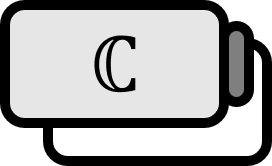Proof of Cauchy's Theorem in Complex Analysis
Theorem 1
Let’s assume that $\mathscr{C}$ is a simple closed path and $f: A \subseteq \mathbb{C} \to \mathbb{C}$ is analytic in its interior and $f '$ is continuous. Then, $$ \int_{\mathscr{C}} f(z) dz = 0 $$
Proof
For $a \le t \le b$, $$ z(t) = x(t) + i y(t) \\ f(z) = u(x,y) + i v(x,y) $$ then since $\displaystyle {{dz} \over {dt}} = x ' + i y '$, $$ \begin{align*} f(z)dz =& f(z) ( x ' + i y ' ) dt \\ =& (u + i v ) ( x ' + i y ' ) dt \\ =& (u x ' - v y ' ) + i (v x ' + u y ' ) dt \end{align*} $$ and $\displaystyle x ' = {{dx} \over {dt}}$ and also because $\displaystyle y ' = {{dy} \over {dt}}$, $$ \begin{align*} \int_{\mathscr{C}} f(z) dz =& \int_{a}^{b} (u x ' - v y ' ) dt + i \int_{a}^{b} (v x ' + u y ' ) dt \\ =& \int_{\mathscr{C}} (u dx - v dy ) + i \int_{\mathscr{C}} (v dx + u dy) \end{align*} $$ here the condition that the derivative is continuous is used.
Green’s theorem: If $P,Q$ is continuous and its derivative is also continuous, then $$\int_{\mathscr{C}} (Pdx + Qdy) = \iint_{S} (Q_{x} - P_{y}) dx dy$$
According to Green’s theorem, $$ \int_{\mathscr{C}} f(z) dz = - \iint_{S} (v_x + u_y) dxdy + i \iint_{S} (u_x - v_y) dxdy $$ Meanwhile, $u,v$ are solutions satisfying the Cauchy-Riemann equations, so $u_y = -v_x$ and $u_x = v_y$. Hence, $$ \int_{\mathscr{C}} f(z) dz = 0 $$
■
Description
This means that under certain conditions, it’s not necessary to calculate the definite integral at all. Cauchy is known as the ‘father of analysis’, and this theorem is extremely important, just as his name alone indicates. As you can see, fulfilling the conditions of function $f$ is not that difficult, so it can be utilized in many places.
It’s not only practical but also remarkably simple, so you can even appreciate the mathematical beauty.
While dealing with derivatives and integrals, a rough interpretation of analysis was used. It’s synonymous in result, but rigorously it’s an incorrect process, so caution is needed.
I introduce another useful theorem without proof.
Generalization
The Cauchy-Goursat Theorem
In a simply connected region $\mathscr{R}$, if $f$ is analytic, for a simple closed path $\mathscr{C}$ in the $\mathscr{R}$ interior, $$ \int_{\mathscr{C}} f(z) dz = 0 $$
The French mathematician Goursat generalized this by eliminating the condition on the derivative of $f$. It’s a fact that it is more useful than Cauchy’s theorem, so make sure to remember it.
See also
Osborne (1999). Complex variables and their applications: p82. ↩︎
